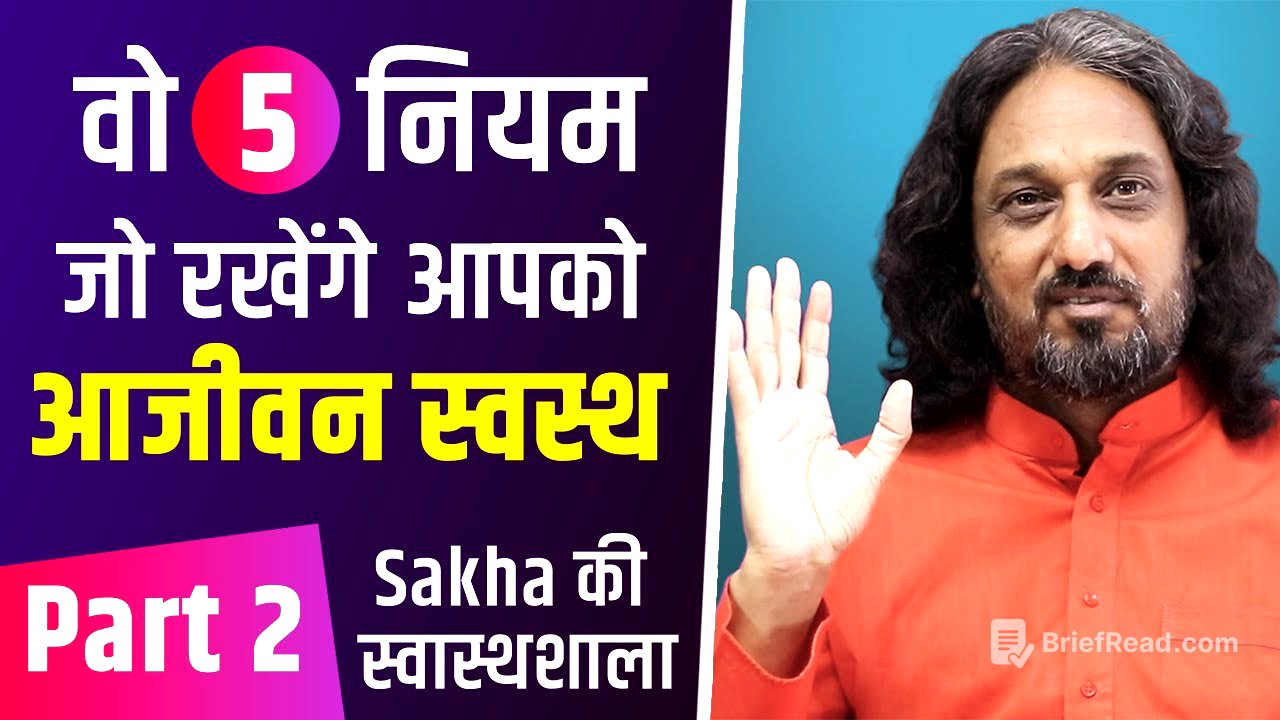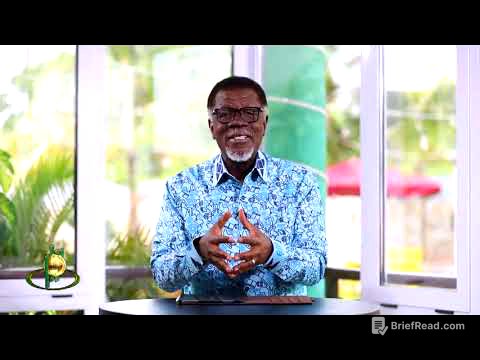TLDR;
This video discusses health, pain management, and overall well-being. It emphasizes the importance of understanding the body's signals, such as pain and fever, rather than immediately suppressing them with medication. The video also outlines five key principles for maintaining health: eating when hungry, eating only until satisfied, getting good sleep, waking up with a smile, and listening to the inner clock.
- Pain and fever are not enemies but signals from the body.
- The brain is the primary healer.
- External knowledge should not override the body's natural capacity.
- Five principles for health: eat when hungry, eat until calm, sleep well, wake up smiling, listen to your inner clock.
Introduction [0:00]
The speaker addresses common health questions and concerns, such as constipation, knee pain, and back pain. He argues that people often seek treatment for minor issues that the body can resolve on its own. He emphasizes that the brain is central to healing and that pain is a message, not a disease.
The Brain's Role in Healing [0:53]
The speaker explains that the brain is the primary organ responsible for healing. Pain, regardless of its location, is a signal sent to the brain. Instead of immediately suppressing pain, one should allow the brain to address the underlying issue. Painkillers only mask the symptoms by making the person unconscious of the pain, rather than curing the problem.
Understanding Pain as a Signal [5:11]
Pain is not a disease but a message from the body indicating a problem. The mind becomes active when it receives this message, and suppressing pain is like turning off a fire alarm, which can lead to more significant problems. The speaker advises against quickly seeking answers and putting the mind to sleep with medication.
Walking as Controlled Falling [8:17]
The speaker uses the analogy of walking to illustrate how the body constantly manages imbalances. Walking is described as "falling and getting hold of it," with each step involving a controlled loss of balance and recovery. Similarly, the body handles pain and other issues through its natural mechanisms.
The Dangers of Suppressing Pain [9:19]
Removing or stopping the pain alarm can lead to broken bones and diseases without the person realizing it. Suppressing pain is compared to hacking a bank account and showing a false balance, creating a false sense of well-being. The speaker emphasizes that pain should not be considered an enemy, as it allows the body to treat itself.
The Speaker's Personal Experience [11:00]
The speaker shares his father's experience with painkillers, noting that while his father found temporary relief, the long-term use of painkillers led to various diseases, including cancer. This personal anecdote underscores the importance of allowing the body to heal naturally.
Fever as a Cleansing Process [13:54]
Fever is likened to a cleaning process, similar to cleaning the house during Diwali. It indicates that the body is fighting a problem. The speaker advises against immediately fighting the fever but suggests using cold water compresses to manage excessive heat.
Two Things Not to Consider as Enemies [16:37]
The speaker reiterates the importance of not considering pain and fever as enemies. He acknowledges that many people are habituated to taking pills and may find it difficult to change their mindset.
Five Solutions for Health [24:01]
The speaker introduces five solutions for maintaining health:
- Eat food when hungry.
- Eat only as much food as calms you down.
- Get good sleep.
- Wake up smiling in the morning.
- Listen to the inner clock.
Eating When Hungry [28:05]
The speaker emphasizes that food should be eaten only when one is hungry. When hungry, the body produces enzymes and chemicals that can digest anything. He also advises against overeating and suggests eating only until satisfied.
Getting Good Sleep [38:00]
Good sleep is defined as stress-free and worry-free sleep. The speaker acknowledges that it can be challenging to achieve good sleep and promises to share experiments and ways to get good sleep easily in future videos.
Waking Up Smiling [42:14]
Waking up smiling is presented as a way to get rid of 50% of problems. The speaker suggests finding personal ways to wake up with a smile, such as looking at a photo of a loved one or expressing gratitude for a new day.
Listening to the Inner Clock [44:07]
Listening to the inner clock means paying attention to the body's natural signals, such as hunger, thirst, and the need to urinate. The speaker criticizes making strict rules about drinking water and other bodily functions, emphasizing that the body knows what it needs.
Conclusion [50:52]
The speaker concludes by encouraging viewers to stop considering illness as an illness and pain as an enemy. He urges them to incorporate the five principles into their lives and promises to provide more answers and insights in future videos. He emphasizes that the mind is the best doctor and should not be treated like a compounder or peon.









